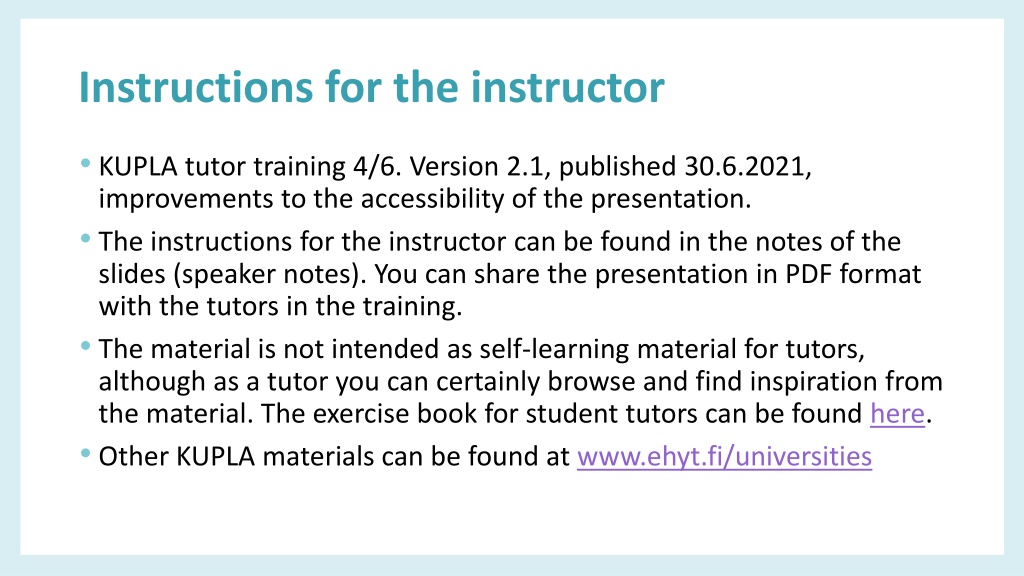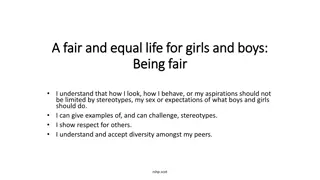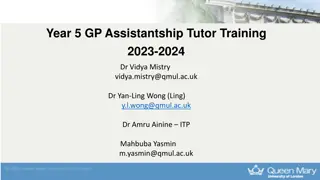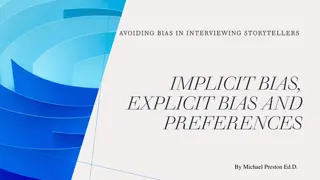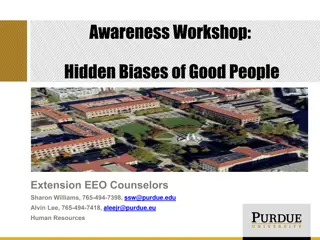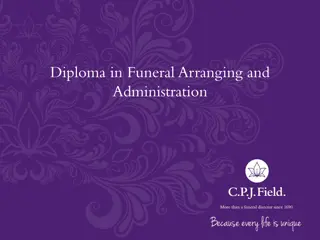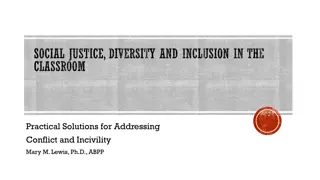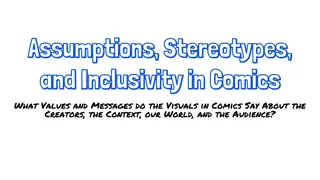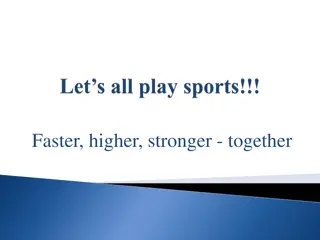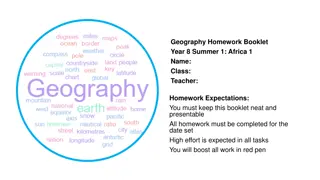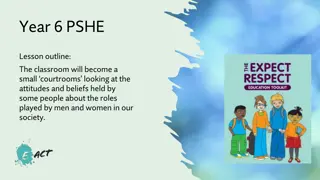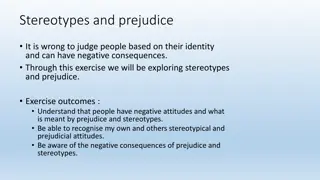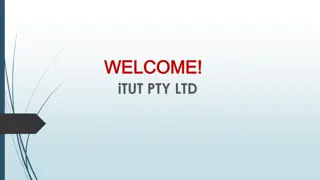Understanding and Addressing Prejudices and Stereotypes in Tutor Training
Explore the importance of recognizing and addressing prejudices and stereotypes in tutor training to create an inclusive and welcoming environment for all students. Learn how to plan activities that promote diversity and inclusivity, and understand the impact of stereotypes on student experiences. Through open conversations and awareness, overcome biases and create a supportive learning environment.
Download Presentation

Please find below an Image/Link to download the presentation.
The content on the website is provided AS IS for your information and personal use only. It may not be sold, licensed, or shared on other websites without obtaining consent from the author. Download presentation by click this link. If you encounter any issues during the download, it is possible that the publisher has removed the file from their server.
E N D
Presentation Transcript
Instructions for the instructor KUPLA tutor training 4/6. Version 2.1, published 30.6.2021, improvements to the accessibility of the presentation. The instructions for the instructor can be found in the notes of the slides (speaker notes). You can share the presentation in PDF format with the tutors in the training. The material is not intended as self-learning material for tutors, although as a tutor you can certainly browse and find inspiration from the material. The exercise book for student tutors can be found here. Other KUPLA materials can be found at www.ehyt.fi/universities
TUTOR TRAINING Acknowledging diversity and inclusiveness in tutoring
What might a fresher be thinking in the beginning of their studies? I fear that my gender will be assumed There is a lot of competition here! I want to participate but not speak Unlike with others, people only speak English to me even though I am Finnish I want to get to know others even though I am older No-one intervened with the n-word used at the lecture I cannot participate because the get- together is in a non- accessible space I am not always invited because I don t use alcohol
Training objective Get to know stereotypes and our own prejudices. Learn how to plan tutoring to be inclusive ( = to include everyone and acknowledge diversity). Learn how to plan familiarization activities that fit all freshers. The fresher feels welcome
Training topics Prejudices and stereotypes Planning inclusive activities
Prejudices and stereotypes Prejudice refers to an unfounded (favourable or unfavourable) preconceived idea. Becoming free of prejudices requires first recognising them and becoming aware of them. An open conversation can help: it makes generalisations visible and their necessity and accuracy can be examined and questioned Stereotypes are simplified and generalizing conceptions that are often unconscious. Stereotypes are linked to expectations and assumptions about different characteristics or behaviour. Source: The Finnish Association of Adult Education Centres
Stereotype: All students go to student parties Out of first-year students, 17% did not participate in any student events. Most common reasons: 1) lack of time (mainly due to working) 2) not interested (in partying) 3) alcohol usage plays an overly dominant role. Other reasons: (social) anxiety, not having anyone to go with, fear of humiliation, not having been informed about the event, too expensive, children/family... Student events can be exclusive Source: Nyyti ry, 2016
Exercise Diversity and prejudices F Which things cause prejudices when you tell about yourself? - Every time I tell X, people assume that... - E.g. every time I tell that I am a teetotaller (I don t drink) people assume that I am an athlete
Inclusivity Inclusivity means getting people involved and including them. In this training, inclusivity also means enabling involvement and participation. The idea of understanding diversity: no-one is a mistake or a disturbance. It is more socially sustainable to be inclusive than exclusive. All kinds of people are needed. Everyone has an equal right to belong to a study community.
Inclusivity means acknowledging diversity Each person has a different identity and characteristics. Diversity is in all of us. Acknowledging diversity means respecting everyone's identity and characteristics in a positive sense and in a safe environment so that everyone feels welcome as they are without fear of discrimination. Processing and identifying your own prejudices/stereotypes can help you plan tutoring. Source: Culture for All service
Exercise Case Vilkka Consider the following situation with a partner: As a tutor, you would like the freshers to play the Pony game on the first day. In this game, the participants sing and move around rubbing first their cheeks, then their sides and then their bottoms together with another group member. After the game Vilkka, one of the freshers, tells you that the idea of not participating felt embarrassing even though they did not want to want to participate because the physicality of the game felt uncomfortable. - How do you discuss this with Vilkka? How do you receive feedback? - How can you tailor your activity to your target group? Which exercise would you do instead of the Pony game?
Prepare in advance Consider in advance activities with a goal. different ways of carrying out the activity. how to adapt the activity when necessary. If you have the time and the opportunity, read feedback given about tutoring in previous years. What were things that people hoped would be considered/improved? What tips can previous tutors give you? Which situations came as a surprise and how did they alter the planned activities? Even though every fresher is a unique individual it pays off to consider in advance what kind of wishes different people might have for tutoring. E.g. what might a fresher with some bad group experiences expect from you as tutor?
Exercise Activities for a diverse group Find online/brainstorm 1 3 familiarization exercises. Assess how they fit the fictional student characters: A. a student in a wheelchair B. a 45-year-old student C. a student who feels anxious about social situations D. a student who does not want to perform or speak E. a student who has bad experiences about groups F. a student whose native language is not Finnish G. a student who would like to maintain physical distance Only use exercises that can be adapted for everyone to take part easily.
Exercise Spending an evening together with the freshers checklist When you plan the meetings/activities with the group of fresher, note if the ideas fulfil at least some of the following conditions: [ ] People get to know each other [ ] You would participate yourself [ ] Everyone feels welcome as they are [ ] Alcohol does not further participation/drinking alcohol is not assumed [ ] Touching other people is not assumed [ ] There is a clear idea of what the activity includes and what its goal is
Summary Everyone has prejudices about other people. Recognize your own prejudices and use the activities to process prejudices the freshers have regarding studying and the study community. Be careful not to convey to the freshers that there is only one way of being a student. Do not force, pressure or coerce anyone to participate for any reason ( traditions or everyone else does it etc.) Diversity is in all of us: ask how will the activities be the easiest for everyone to participate. Intervene and remind the freshers to always intervene in inappropriate and disruptive behaviour and treatment. Make sure the freshers feel welcome.
KUPLA Students reforming substance use culture The training has been developed by KUPLA Students reforming substance use culture , a joint project by EHYT ry and Nyyti ry. The project was ongoing from 2018 to 2020. National partners in the programme included the National Union of University Students in Finland (SYL), University of Applied Sciences Students in Finland (SAMOK), Finnish Student Sports Federation (OLL) and the Finnish Student Health Service (FSHS). This work is licensed under a Creative Commons Attribution 4.0 International License. Read more about the license on Creative Commons website. This training may be used, shared and modified freely with a reference to KUPLA as the original author. Other materials for the KUPLA project can be found on EHYT's website, www.ehyt.fi
